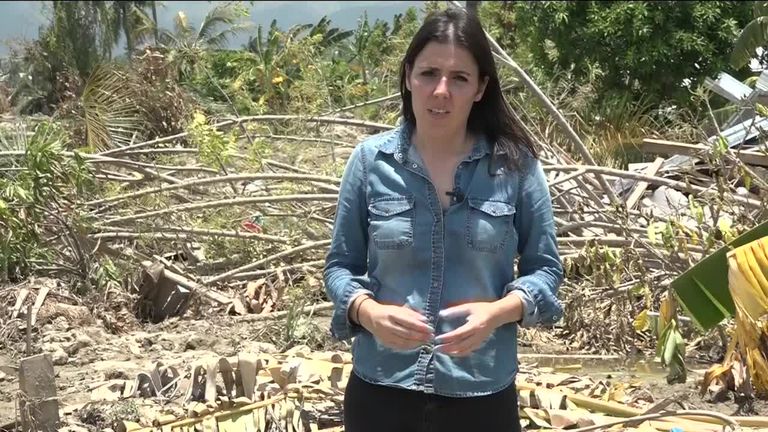Indonesia earthquake: 'My husband's body was swallowed by the ground'
The risk of disease means Surianti cannot take him home - he must lie with hundreds of others killed in Indonesia's disaster.
Thursday 4 October 2018 12:18, UK
Surianti's husband is dead. His body was swallowed by the ground.
There will be no funeral. A mass grave will be his final resting place.
It is the most depressing of places, a sandy pit on a lonely hillside on the outskirts of Palu on the Indonesian island of Sulawesi.
But it is here Surianti now stands next to a truck loaded with body bags waiting to say goodbye.
"Are you okay that we bury him here?" an official asks.
"No, I want to take him home," Surianti replies.
The risk of disease means her wish cannot be granted, instead he must lie with hundreds of other people killed in the earthquake and tsunami on Sulawesi.
"I have nothing. My husband is gone, my house is destroyed, only me and my daughter are left," she tells me.
The stench of decomposition is overwhelming but Surianti does not flinch.
Instead, she quietly watches until the yellow body bag she has carefully tagged is selected.
It is now time for her to bury her husband.
As officials carry the bag down the dusty slope, she runs after them.
This is the man she dedicated her life to and she is determined to accompany him to the end.
As the body is placed next to a row of others, she is asked if she would like to say a prayer.
She whispers a few words and then he is gone.
As diggers pile earth into the pit, she watches, sobbing.
She will not have a dedicated grave to visit so instead she piles up stones and marks them with a stick.
Now a widow, Surianti lives in a makeshift camp with her sister and daughter after her home was destroyed.
She brings us back to Petobo, the place that use to be her home.
Where the village once stood, it is now a muddy wasteland.
She explains the earthquake turned the solid ground to liquid mud.
A whole community, possibly thousands of people, disappeared in minutes, including her husband.
"When he arrived home after work, the ground shook, the mud suddenly appeared, everybody ran.
"There was no time to save anything, just the clothes we were wearing. Nothing else could be saved," she says.
The military still search the ruined land. They know there are no survivors. This is a recovery mission not a rescue.
It is here, in the desolate wasteland that used to be her home, that Surianti grieves for the house, husband and life she had just a week ago.








